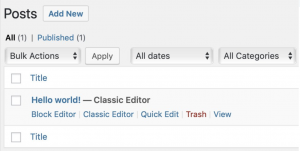Written by Beth Downey
We’ve just returned from a fun and information packed weekend at WordCampUS – the western hemisphere’s global WordCamp conference. We saw old friends, made new connections, took in a lot of information in a short amount of time and sat in on Matt Mullenweg’s “2018 State of the Word.”
The big discussion centered around Gutenberg, the new WordPress editor available in WordPress 5.0. Cutting to the chase, what does that mean for your WordPress powered website? Well, it depends. If your website isn’t highly customized and is not running a ton of plugins, you should be safe. If your website build relies heavily on visual composer, maybe hold off for a minute. In a perfect world, we’ll always advocate for the “latest and greatest,” but plugin builders maintain their code at different paces; the same applies to themes. That’s why it’s very important to research a theme before buying or installing to ensure the code base is maintained and not merely choosing it because it’s pretty.
So what’s a website owner to do? There are a few things: if you aren’t ready to make the move to Gutenberg, you can download and install the Classic Editor plugin, created by WordPress for WordPress.
“Classic Editor is an official plugin maintained by the WordPress team that restores the previous (‘classic’) WordPress editor and the ‘Edit Post’ screen. It makes it possible to use plugins that extend that screen, add old-style meta boxes, or otherwise depend on the previous editor. By default, this plugin hides all functionality available in the new Block Editor (‘Gutenberg’).”
Once you’ve installed the Classic Editor you’ll need to make a few adjustments to make it disable Gutenberg:
1. Open Settings->Writing
2. Set “Allow users to switch editors” to “No”
3. Verify that hovering over posts shows the old “Edit” option.
As always, we’re here for help with all things WordPress. Give us a shout for more information as to how we can help get your websites ready for the exciting future of WordPress. And for more on WordcampUS, read our WordcampUS Roundup here.






